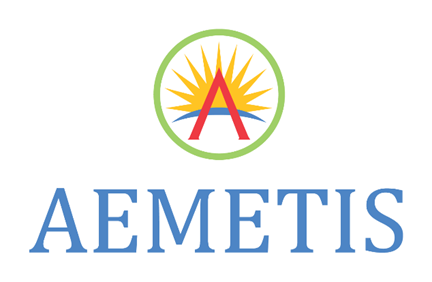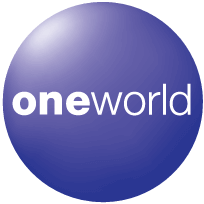Development and Use of SAF (Sustainable Aviation Fuel)
The aviation industry has been working to reduce CO2 emissions from the perspective of reducing fuel consumption. The quality of the fuel used must be changed in order to reduce it further in the future. From this perspective, SAF (Sustainable Aviation Fuel) is being developed and put into practical use in many countries around the world, mainly in Europe and the United States, and it is expected that SAF will be widely used after 2030. In this context, the JAL Group, with the aim of becoming the leading airline in the use of SAF, has set a goal of replacing 10% of fuel on board by 2030. In cooperation with public and private sectors, we will work with stakeholders in Japan and overseas to promote SAF's commercialization .
Specific Initiatives (Overseas)
SAF load in scheduled international flight
JAL loaded SAF in international flight from Chicago O'Hare International Airport to Narita Airport in November 2017 and from San Francisco International Airport to Haneda Airport in January 2019.
Investment in the SAF Manufacturing Business
In September 2018, the JAL Group, together with the Japan Overseas Infrastructure Investment Corporation for Transport & Urban Development, Inc. and Marubeni Corporation, acquired a portion of the shares of Fulcrum BioEnergy, Inc. in California, USA. This is the first investment in a SAF production business by a Japanese company.
Fulcrum BioEnergy, Inc. … A california-based company with a process to produce SAF from municipal solid waste that would normally be disposed of in a landfill. The manufacturing technology has also been fuel standardized by ASTM International, an international standardization and standard-setting organization. Construction of its first plant in Nevada was completed in 2021.
SAF load on delivery flights
Since 2019, SAF has been loaded on delivery flights from the Airbus factory in Toulouse, France, to Haneda Airport for Airbus A350 aircraft received by the JAL Group. In 2021, SAF was also loaded on the JAL Group's ATR-42-600 aircraft.
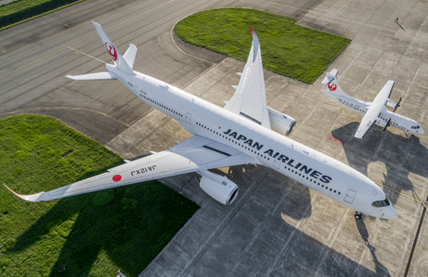
Joint procurement in the oneworld alliance
In November 2021, JAL and 8 members of the oneworld alliance jointly announced and signed an agreement to purchase SAF from Aemetis Inc., a renewable fuel manufacturer in California, USA. The Alliance plans to procure a total of approximately 1.3 million kiloliters of SAF at San Francisco International Airport in the United States over a period of 7 years from 2024, and JAL plans to load SAF on scheduled flight aircraft departing from San Francisco International Airport.
In March 2022, JAL and 5 members of the oneworld alliance jointly announced and signed an agreement to purchase SAF from Gevo Inc., a renewable fuel manufacturer in Colorado, USA. The plan is to procure a total of approximately 750,000 kiloliters of SAF across the alliance over a five-year period beginning in 2027, and JAL plans to load SAF on scheduled flights departing from Los Angeles International Airport, San Francisco International Airport, and San Diego International Airport on the U.S. West Coast.
Specific Initiatives (Japan Domestic)
First flight with SAF using camelina
In 2009, JAL conducted the first test flight using SAF made from non-edible feedstock. This is the world's first flight with SAF using the plant "Camelina."
"Let's fly with 100,000 clothing! JAL SAF Flight"
In October 2018, we launched the "Let's fly with 100,000 clothing! JAL SAF Flight" a project to challenge the production of domestic SAF using cotton clothing collected from customers and many others as feedstocks. During the clothing collection period in 2018 (approximately 3 months), we collected approximately 250,000 items from around the country with the cooperation of approximately 50 companies. In February 2019, with the technical support of Green Earth Institute Co., Ltd., we started to produce SAF from collected cotton clothing using a bio-process developed by Research Institute of Innovative Technology for the Earth(RITE). In late March 2020, the SAF received ASTM D7566 certification, the international fuel standard for SAF, and the production of SAF was successfully completed. In February 2021, the SAF was actually loaded in our scheduled flight.
Although the practical use of SAF is progressing worldwide, this was the first time that domestic SAF has been produced in Japan. This success proved that SAF could be manufactured gathering domestic technology.

Flights with two types of domestic SAF
As a first step toward commercialization, domestic SAF made from woodchips and microalgae produced at a demonstration plants have passed quality inspections and became possible to use for actual operation.
In June 2021, two types of domestic SAF were loaded on one flight. With this flight, The domestic SAF project, which public organizations, SAF manufacturers, supply chain companies, and airlines had been working together for many years, was completed successfully.
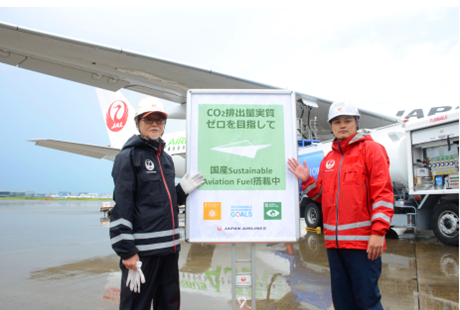
Development of Joint SAF Report
「All Nippon Airways Co., Ltd. (ANA) and JAL have developed a joint report “Toward Virtually Zero CO2 Emissions from Air Transport in 2050,” with the aim of expanding awareness and promoting understanding of SAF.」
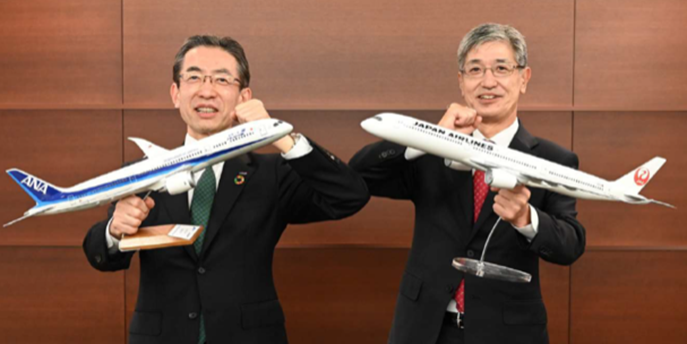
Establishment of a voluntary organization to commercialize and promote SAF
-
We established ACT FOR SKY, in cooperation with JGC HOLDINGS CORPORATION, REVO International Inc., and ALL NIPPON AIRWAYS CO., LTD.
As a leading company in the use of SAF, we will work with 46 companies (as of March 2025) across industries to build supply chains and promote the use of domestic SAF. -

Participation in the Public-Private Council
In order to promote the development and use of SAF throughout Japan, the JAL Group actively participates in the "Public-Private Council for the Introduction and Promotion of SAF" organized by the the Ministry of Land, Infrastructure, Transport and Tourism.

